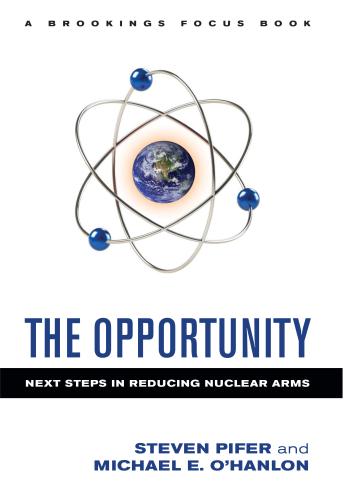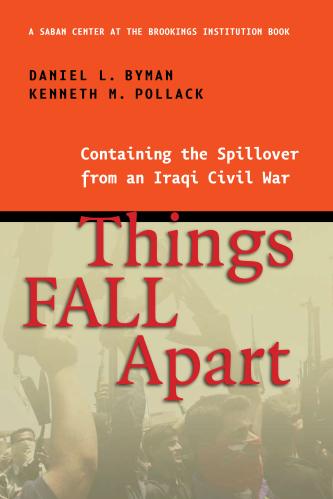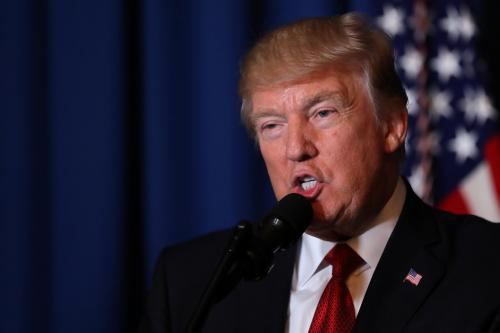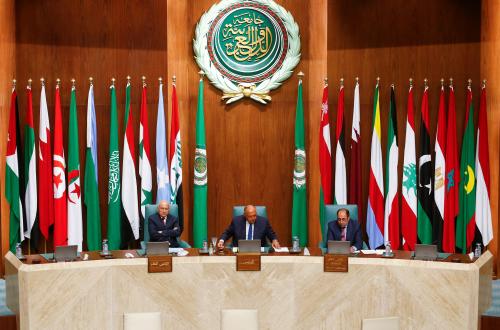Daniel Byman, senior fellow in the Center for Middle East Policy: As someone who advocated that the administration take a harder stance against the regime of Bashar Assad when the civil war first began, I should be pleased that the Trump administration launched cruise missiles against a Syrian regime airfield—but I’m nervous instead. The bombing strikes me more as an attempt at therapy to salve our anguished conscience and feels like we are taking a stand rather than a serious move to change our policy in Syria for the better.
The strikes represent a dramatic shift in the administration’s policy. When he came into office, it seemed that Trump wanted to work with Russia in Syria against the Islamic State and implicitly accepted that Russia’s ally, the Assad regime, would stay in power. Just a few days ago, Secretary of State Rex Tillerson and U.N. Ambassador Nikki Haley seemed to signal that the United States was no longer committed to removing Assad. Peace talks, not bombs, seemed to be in the cards.
I worry that the about-face against the Assad regime is not coordinated diplomatically. We are acting in haste, without making sure that our use of force is serving our political strategy rather than determining it. So we can feel good that we punched back against a dictator who is brutalizing his own people, but the bombing will do little to advance American goals in Syria without more dramatic and lasting changes. (This comment is excerpted from a post at Lawfare.)
Michael O’Hanlon, senior fellow and co-director of the Center for 21st Century Security and Intelligence: The U.S. cruise missile strike on a Syrian air base is a welcome development. It sends a strong message to President Bashar Assad that chemical weapons will not be tolerated and to Russia that the United States is not afraid to act. It also signals to the world that President Trump is capable of using American military power assertively yet responsibly.
But there is no obvious military step that could follow. What is needed is a political strategy for Syria that squares this circle. Assad must go, yet he will likely stay. That is a paradox that requires creative thinking and compromise.
Two changes in our strategy are needed. First, we need more friendly military power on the ground in Syria, both to liberate cities held by ISIS and to make Assad feel the heat so he will negotiate. Second, we need a short-term way to protect Sunni and Kurdish Syrians in autonomous zones that would be governed and protected separately, even if Assad remains nominally in charge. His removal can be achieved more slowly and gradually, as long as those whose people have been massacred can get out from under his rule in the meantime.
Trump’s use of cruise missiles was justifiable and useful, but now comes the more complex part. He needs to develop a broader strategy that envisions a Syria in which all groups have their rights and their protection, through some type of plan for self-governance in regions where Kurds and Sunni Arabs predominate. That might just work. (This comment is excerpted from an op-ed at USA Today.)
Gen. John Allen (ret.), distinguished fellow and chair of Security and Strategy: We should not miss the reality that this strike will also be of great interest to President Xi Jinping of China and North Korean leader Kim Jong-un. Of course President Trump and President Xi are together as I write this.
President Trump is casting a very wide net here, and it would be in the interests of others to consider this strike in a broader policy context of a new President and his administration.
By punishing Assad—and by extension his Russian patron—he is clearly sending a wide signal.
Natan Sachs, fellow in the Center for Middle East Policy: The strike is a strong message, and a good one in these circumstances.
It was notable, I thought, how the president ended his statement from Mar-a-Lago last night: “God bless America…and the entire world.” The strike in Syria does seem to present a profound—and quick—change in Trump’s approach to foreign policy (how long it will last, we don’t know). The rationale he gave for it was a mixture of the responsibility to protect innocent civilians and the upholding of norms and treaties against the use of chemical weapons, a far cry from an “America First” foreign policy.
It is also a far cry from the initial Russia-centered approach to Syria. The United States has now actively engaged on the opposing side to the war, coupled with Rex Tillerson publicly rebuking Russia. Crucially for many of the U.S. partners in the region—including Israel and Saudi Arabia— the strike also pits the United States actively against Iran and Hezbollah, in addition to its anti-ISIS campaign.
America’s regional partners will clearly welcome this, and, more importantly, the display of resolve and the willingness to use power, something they felt Obama lacked.
Yet as Dan notes, the obvious question is what comes next. Trump called on “all civilized nations” to join the United States in seeking to end the bloodshed and “also to end terrorism of all kinds and all types.” That’s a tall order, to say the least. The same Middle East dilemmas that plagued recent presidents now plague Trump. Will he stop now, content to show resolve but without actually working to achieve those goals? Or will the United States slide toward Middle East involvement of a magnitude I doubt Trump, or the American public, have an appetite for?
Chuck Call, nonresident senior fellow in the Foreign Policy program: The missile strikes against regime targets in Syria represent a dramatic turnaround of U.S. policy. What does this mean for global norms and U.S. policy? There are pros and cons of this surprising action.
Pros include:
- The U.S. has demonstrated clear support for an international norm against the use of chemical weapons, and signaled a cost for future use of such weapons.
- The United States has demonstrated a willingness to use its powerful military might swiftly, forcing the Russians, the Chinese, the North Koreans and other countries to consider the possibility of unpredictable and lethal reactions by the United States.
- The strikes may not change the strategic situation in Syria, but they may dissuade future decisions by the Syrians and their Russian and Iranian backers to use weapons and perhaps other indiscriminate weapons like barrel bombs or cluster bombs.
Cons include:
- These minimal strikes are unlikely to dissuade the Assad regime from much more than using chemical weapons again, much less weaken Assad in any strategic sense or bring the war closer to an end.
- Yikes, we have a president whose policy can turn on a dime and take military acton based on one televised incident!
- This act reflects a disregard for multilateral organizations and approaches, and its international legal basis remains unclear.
How do these pros and cons add up? It is hard to say in these early hours after the strikes. If the use of chemical weapons is deterred and improved communication with allies and enemies ensues, then a notoriously non-rational administration will have fostered a rational outcome. If, however, these strikes are not followed by strategic policy and actions, then their negative effects may reinforce early impressions of an incompetent new administration. (This comment is excerpted from an Order from Chaos blog post.)













Commentary
Around the Halls: What Brookings experts are saying about the U.S. airstrikes on Syria
April 7, 2017